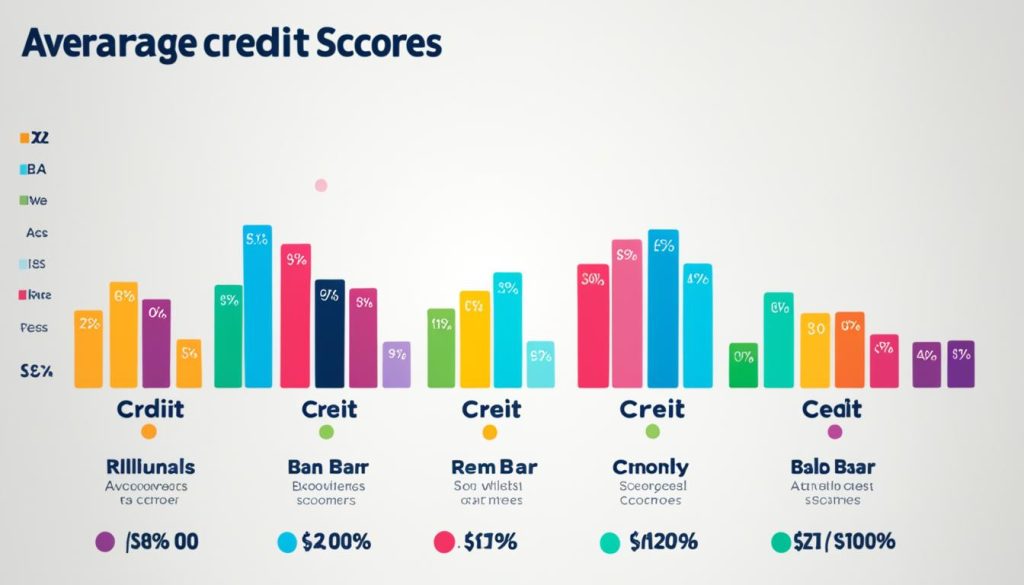When it comes to your personal finances, your credit score holds immense power. Lenders and financial service providers rely on it to assess your creditworthiness and determine your eligibility for loans, credit cards, insurance, and more. If you’re looking to secure a loan from a reputable online lender like Earnest, understanding the minimum credit score requirements is crucial.
At Earnest, they have specific credit score criteria that potential borrowers must meet to qualify for financing options. Knowing the minimum credit score required for Earnest loans can help you gauge your eligibility and take steps to improve your creditworthiness.
Key Takeaways:
- Earnest has minimum credit score requirements for their loans
- Understanding these requirements is important to determine your loan eligibility
- Improving your credit score can increase your chances of qualifying for Earnest financing
- Monitoring your credit health regularly is essential for maintaining good creditworthiness
- Take proactive steps to improve your credit score and unlock better financial opportunities
How Credit Scores Are Determined
Credit scores are determined by two popular models: FICO and VantageScore. These credit scoring models evaluate various factors to calculate your credit score, which is a numerical representation of your creditworthiness. Understanding how these models work can help you manage and improve your credit standing.
FICO score: The FICO score ranges from 300 to 850 and is widely used by lenders to assess credit risk. It considers multiple credit score factors, including:
- Payment history: Your track record of making timely payments on credit accounts.
- Amounts owed: The total amount you owe on your credit accounts and the utilization of your available credit.
- Length of credit history: The duration of your credit accounts and the age of your oldest account.
- Credit mix: The variety of credit accounts you have, such as credit cards, loans, and mortgages.
- New credit: The recent credit inquiries and new accounts opened.
VantageScore: The VantageScore also ranges from 300 to 850 and is another popular credit scoring model. It takes into account similar credit score factors, including:
- Payment history: The consistency of your past payments and any missed or late payments.
- Depth of credit: The length and diversity of your credit history, considering different types of credit.
- Credit utilization: The percentage of your available credit that you’re currently using.
- Balances: The total amount you owe on your credit accounts and any outstanding balances.
- Recent credit: The frequency of your credit applications and new accounts.
- Available credit: The amount of credit you have available compared to your credit limits.
These credit scoring models use complex algorithms to weigh the different credit score factors and generate a credit score. It’s important to note that FICO scores and VantageScores may slightly differ due to variations in their scoring methodologies.
Having a good credit score is crucial as it determines your loan eligibility, interest rates, and can even impact other aspects of your financial life, such as renting an apartment or securing employment. Now, let’s explore how credit scores shifted during the pandemic and how they continue to evolve in the post-pandemic era.
Stay tuned for the next section to learn about the interesting credit score shifts during the pandemic.
Credit Score Shifts during the Pandemic
The pandemic had a significant impact on credit scores, with unexpected shifts in the midst of financial struggles. Despite these challenges, the average credit score actually increased, showing remarkable resilience. This positive trend was observed across all credit tiers, including borrowers with poor and fair credit.
Households with poor credit experienced an average increase of 16 points, while those with fair credit saw an average increase of nine points. These improvements are particularly noteworthy considering the difficult economic circumstances of the pandemic.
Several factors contributed to this surprising improvement. Mortgage forbearance programs and the pause on student loan payments alleviated financial burdens for many borrowers, enabling them to maintain better credit habits. Government stimulus checks and increased Child Tax Credit checks also provided much-needed relief, reducing financial stress and allowing individuals to make progress on their credit health.
Additionally, one notable factor that impacted credit scores during the pandemic was reduced credit card utilization. With limited opportunities for travel and entertainment, many individuals reduced their spending and relied less on credit cards. Lower credit card utilization contributed to improved credit scores for borrowers across the board.
This shift in credit scores during the pandemic highlights the resilience and adaptability of individuals in managing their finances during challenging times. It also underscores the importance of government support programs and the positive impact they can have on improving credit health.

The Impact of Reduced Credit Card Utilization
“Reduced credit card utilization during the pandemic played a significant role in improving credit scores. With limited opportunities for spending, individuals relied less on credit cards, resulting in lower credit card balances and utilization rates.” – Financial Expert
As the image above illustrates, the pandemic had a transformative effect on credit scores, with borrowers experiencing substantial improvements. This positive shift provides hope and inspiration for individuals looking to improve their credit health, even in the face of challenging circumstances.
Current Average Credit Scores
Even after the pandemic, credit scores have continued to rise, reflecting the financial resilience and stability of borrowers. In April 2023, the average credit score was 718, indicating a positive trend in creditworthiness. However, average credit scores can vary across different age groups, with each generation exhibiting unique credit profiles.
Generation Z (born 1997-2012) – Average Credit Score: 680
Generation Z, the youngest generation of adults, has an average credit score of 680. As this generation embraces financial independence and takes on new financial responsibilities, establishing and maintaining good credit habits are essential for building a solid foundation.
Millennials (born 1981-1996) – Average Credit Score: 690
Millennials, often referred to as digital natives, have an average credit score of 690. This tech-savvy generation faces unique financial challenges, including student loan debt and an evolving job market. However, they are also known for their financial creativity and resourcefulness.
Generation X (born 1965-1980) – Average Credit Score: 709
Generation X, the “sandwich generation” balancing responsibilities between aging parents and young children, boasts an average credit score of 709. This generation demonstrates a strong credit history and a cautious approach towards debt management.
Baby Boomers (born 1946-1964) – Average Credit Score: 745
Baby Boomers, who have weathered multiple economic cycles, have an average credit score of 745. As they approach retirement and seek financial stability, this generation showcases a long-established credit history and responsible financial behaviors.
Silent Generation (born 1928-1945) – Average Credit Score: 761
The Silent Generation, born during the Great Depression and World War II, possesses an average credit score of 761. This generation exhibits a strong credit profile, influenced by their frugal upbringing and conservative approach towards debt.
Understanding the average credit scores across different generations provides valuable insights into the credit health and financial habits of various age groups. It emphasizes the importance of credit literacy and proactive credit management to secure better financial opportunities and overall financial well-being.

Credit Scores in a Post-Pandemic Era
Credit scores have seen an upward trend during the pandemic and have continued to rise in the post-pandemic era. However, several factors could potentially impact these scores moving forward.
One such factor is increased discretionary spending. As the economy recovers and people regain confidence, there may be a surge in consumer spending. This increased spending can affect credit scores if individuals are not mindful of their spending habits and fail to manage their finances responsibly.

In addition to increased discretionary spending, inflation is another factor that could impact credit scores. As prices rise, the cost of living can become higher, potentially straining individuals’ financial situations. If individuals struggle to keep up with inflation and fail to make timely payments, it could negatively affect their credit scores.
Furthermore, the resumption of student loan payments after the pandemic pause is an important consideration. Many individuals have been granted relief during the pandemic, but as loan payments resume, it is crucial to ensure prompt payment. Delayed or missed payments can have a derogatory impact on credit scores.
Lastly, rising interest rates can also influence credit scores. Higher interest rates mean increased borrowing costs, and borrowers may find it challenging to keep up with repayments. Consistently missing payments or carrying high balances can lead to a decrease in credit scores.
“It’s important for individuals to remain aware of these factors and take proactive steps to protect their credit health,” advises financial expert Jane Smith. “Maintaining a budget, making timely payments, and keeping debt levels manageable are essential for safeguarding credit scores in a post-pandemic era.”
By staying informed and taking proactive measures, individuals can navigate the post-pandemic era while maintaining healthy credit scores.
The Significance of Your Credit Score
Your credit score is a critical factor in managing your personal finances. It has a direct impact on various aspects of your financial life, including loan eligibility, interest rates, insurance eligibility, renting an apartment, and even employment background checks. Understanding the significance of your credit score and maintaining a good one can open up a world of financial opportunities.
When it comes to loan eligibility, lenders evaluate your credit score to assess your creditworthiness. A higher credit score increases your chances of being approved for loans, such as mortgages, auto loans, and personal loans. It also influences the interest rates you may qualify for. Lenders typically offer lower interest rates to borrowers with higher credit scores, which can save you a significant amount of money over the loan term.
Insurance companies also consider your credit score when determining your eligibility and premiums. A good credit score demonstrates responsible financial behavior, leading insurers to view you as a lower risk. This can result in lower insurance premiums for policies like auto, home, and renters insurance.
When it comes to renting an apartment, landlords often conduct credit checks as part of the application process. A good credit score can help you stand out as a reliable and trustworthy tenant, increasing your chances of securing the rental property you desire.
Additionally, employers may perform background checks that include reviewing your credit history. While credit checks are more common for roles that require financial responsibility, some employers conduct them as part of their standard screening process. A strong credit score can give potential employers a positive impression of your financial stability and responsibility.
It’s clear that maintaining a good credit score is crucial for maximizing your financial opportunities. By consistently practicing good financial habits, such as paying bills on time, keeping credit card balances low, and avoiding excessive new credit applications, you can improve your credit score over time.

Remember, your credit score is not static and can be improved with time and diligent financial management. By prioritizing your credit health, you can navigate through various financial milestones with greater ease and confidence.
Conclusion
Building and maintaining a good credit score is essential for your financial well-being. A higher credit score not only increases your chances of loan approval but also leads to better loan terms and lower interest rates. By understanding the factors that influence your credit score, you can take steps to improve it and access more financial opportunities.
One of the key strategies is to regularly monitor your credit. Keep an eye on your credit reports and scores to identify any errors or fraudulent activities. You can also track the progress of your credit-building efforts and see the impact of your actions on your credit profile. Additionally, practicing good credit habits, such as paying bills on time, keeping credit card balances low, and diversifying your credit mix, can contribute to a positive credit score.
Remember, having a good credit score not only matters when you’re applying for loans or credit cards. It can also affect your insurance eligibility, rental applications, and even employment background checks. Taking control of your credit health can result in long-term financial stability and open up opportunities for a brighter financial future.


No comments! Be the first commenter?